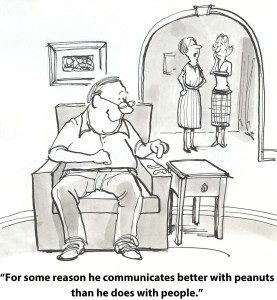 Social phobia is excessive anxiety in social situations often triggered by fears of being negatively judged by others. People with social anxiety often feel as though they are being watched and scrutinized. They fear that they will be humiliated in a social situation and may experience panic symptoms such as blushing or sweating. Additionally, they may feel ashamed and embarrassed that others will notice their anxiety symptoms. Often the person with social anxiety issues may avoid social situations all together or endure them with great discomfort. In reality, the harshest critic someone with social anxiety will encounter in most social situations, is themselves.
Social phobia is excessive anxiety in social situations often triggered by fears of being negatively judged by others. People with social anxiety often feel as though they are being watched and scrutinized. They fear that they will be humiliated in a social situation and may experience panic symptoms such as blushing or sweating. Additionally, they may feel ashamed and embarrassed that others will notice their anxiety symptoms. Often the person with social anxiety issues may avoid social situations all together or endure them with great discomfort. In reality, the harshest critic someone with social anxiety will encounter in most social situations, is themselves.
If you believe you have social anxiety consider the following:
- Projection: The negative thoughts you believe the other person is having about you is often a projection of your own thoughts or doubts. Projection most often occurs socially when you are meeting a stranger. The unknown mind of a stranger creates more room for you to speculate about what he or she may be thinking. Consequently, this can cause you to fill in the unknown blanks with negative judgments thus creating anxiety. Being aware of projection can help you differentiate between your own thoughts and erroneous assumptions about what others may be thinking.
- Egocentricity: In general, if you were to ask someone what they are thinking about, more often then not, it is not you. People are typically pre-occupied with themselves. Even if others are thinking about you, it is unlikely they will be fixated on a social error you made for an extended amount of time. The comment you feel ashamed about in most cases, if heard, will be forgotten. There is only a limited cognitive capacity that people have regarding information. The social error you think was horrific will unlikely be stored in the long-term memory of your peer or the observer.
- Self-Fulfilling Prophecy: Although you are your own worst critic your self-review can be contagious. The negative beliefs you have about yourself regarding social interactions may lead to withdrawal behaviors. Being excessively quiet to avoid saying the wrong thing can possibly induce people to think you are aloof, indifferent or awkward. Keep in mind the negative message starts with you and what you say about your self. When you like yourself others often will as well.
- Exposure: Facing a fear is the only way to eradicate it. To conquer social phobia it is important to put yourself in situations so you can learn that you can survive the fear. It’s important to note that if you have social phobia is not enough to just go to social events. You must actively engage socially by talking/interacting and actually facing your fears and core anxiety. It is advised to work on exposure exercises with a therapist, who can help you create a hierarchy of fears that you can gradually confront starting with a moderate fear to the most anxiety provoking. Additionally, joining an improvisational group, acting class, toasts masters, or a psychotherapy group are great venues for exposure you can engage or build up to.
- Mindfulness: Use mindfulness when interacting socially. Mindfulness can help you focus on the interaction rather than on the internal noise going on in your head. With mindfulness skills you can learn how to gently shift your attention towards the external conversation letting your internal fears or thoughts recede to the background. You can learn that your internal thoughts are passing experiences and sensations that do not define a fixed reality. See the mini-mindful toolkit for more information on mindfulness.
- Turning the Camera Lens: People with social phobia tend to hyper-focus on their behavior paying too much attention to their own thoughts and actions. As a result it may be beneficial to attempt to shift your focus on the people you are interacting with. Pay close attention to their posture, affect, and body language. Are they nervous? Focusing on others can help you get out of your own head.
- Responsibility: Often the socially anxious person believes if an interaction goes poorly it is because of something they did. It is important to be aware that an interaction is a dynamic that not one person is solely responsible for. If an awkward or socially boring social event occurs it may not be you, but rather the other person’s issues that lead to the uncomfortable interpersonal experience.
